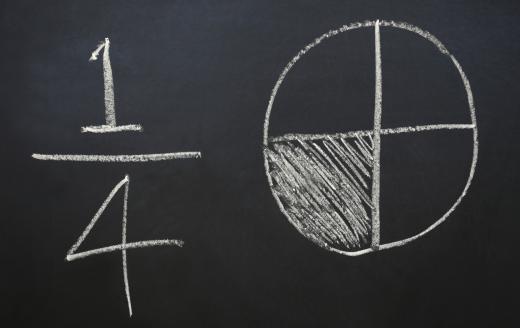At WiseGEEK, we're committed to delivering accurate, trustworthy information. Our expert-authored content is rigorously fact-checked and sourced from credible authorities. Discover how we uphold the highest standards in providing you with reliable knowledge.
What Is Numeracy?
Numeracy is where an individual can understand and use numbers. It is a form of literacy and has similar expectations and problems. Numeracy is about understanding the world through numbers and through math. Basic numeracy includes understanding number values, basic arithmetic and moves on to more advanced mathematics.
The term numeracy was first used by Sir Geoffrey Crowther in 1959. While newer than literacy, it forms one of the most important parts of education. Numeracy is a term widely used and recognized throughout the world. Some educators and establishments in America, however, also use the term quantitative literacy instead.

At its most basic, the discipline is about understanding number systems. This means understanding the value of 1, 7 and 66. For example, the teacher tells the student she has four apples and the student understands how many this is. At more advanced part of number systems are fractions and the use of decimal points or the replacement of numbers with symbols as found in algebra.
Basic arithmetic means being able to understand 1 + 1 = 2. It includes addition, subtraction, multiplication and division. More advanced calculations include squaring and square-rooting numbers, arithmetic with fractions and trigonometry.

Educational establishments believe that numeracy is equal to literacy in importance. In Britain, students applying to university require certain A-level grades to get in. General Certification in Secondary Education (GCSE) results are usually unimportant, with two exceptions: English and math. In Japan high school, university and employment exams always test Japanese and math with other subjects being optional.

A good level of numeracy offers the individual many benefits. They are able to participate in more areas of society and to attain higher levels of employment. Good math skills are essential for jobs in physics, engineering, architecture and accountancy. Such skills are also useful in everyday life, such as with shopping and managing a household budget.
Douglas Hofstadter coined the term ‘innumeracy’ to describe people who are numerically illiterate. Innumeracy holds less stigma than illiteracy, and some business leaders have even boasted about their poor math skills. Low levels of numeracy have been linked to poor news reporting, business failures, poor levels of risk assessment and lower job prospects.
These low levels of skill can be put down to poor teaching or laziness, but they can also be due to a medical disadvantage. Dyscalculia is the numerical version of dyslexia. Dyscalculia sufferers have a normal intelligence quotient (IQ) range, but struggle to deal with numbers and basic math. A range of software programs and educational therapy techniques have been developed to reduce the problem of dyscalculia. Reduced numeracy via brain damage is known as acalculia.
AS FEATURED ON:
AS FEATURED ON:













Discuss this Article
Post your comments